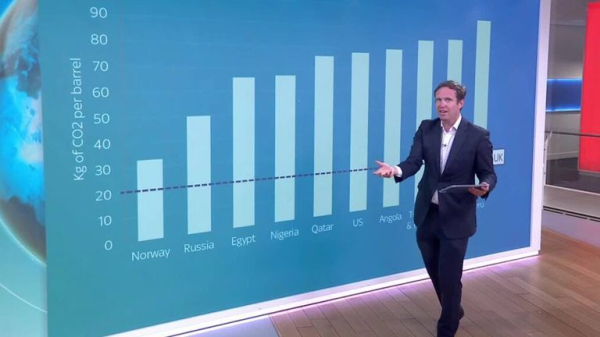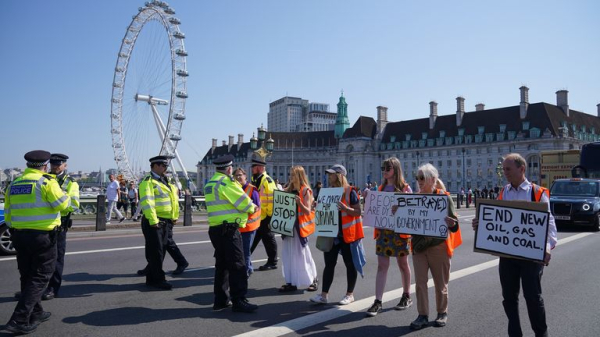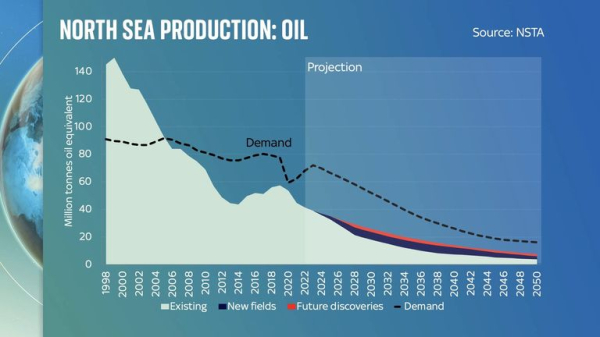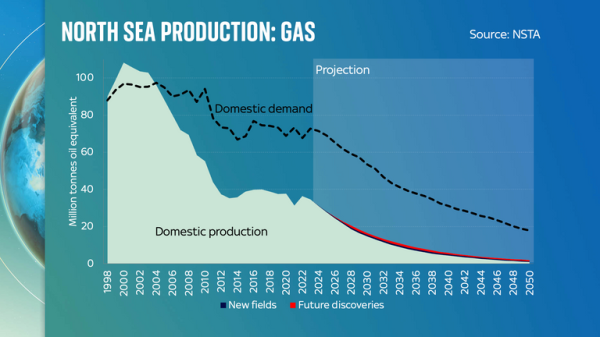
Let’s start with something important.
Even if we hit net zero carbon emissions by 2050, we in this country and others around the world are still set to be burning oil and gas in large quantities.
That’s not a failure by the way; that, it turns out, is part of the plan.
Even the most ambitious mainstream schemes for reducing our environmental footprint – including the ones championed by campaign groups like Just Stop Oil – still rely on fossil fuels for roughly a quarter or a fifth of our energy by the middle of the century.
That might sound incompatible with the ambition of “net zero” but it comes back to the first word – the “net” bit.
We aren’t planning to disavow fossil fuels entirely. Instead, we are planning to reduce our use of them considerably, but for the hardest-to-abate sectors – like cement manufacture – we are planning to carry on emitting carbon, but to mop it up afterwards.
How?
Partly it’ll involve using land better, planting more trees and finding ways to absorb carbon using new farming techniques.
But partly it involves something called carbon capture and storage (CCS). This is where you attach a unit to the top of a chimney and use special chemicals to absorb the carbon coming out.

Or you can suck in atmospheric air and do much the same thing – this is sometimes called direct air carbon capture, but it’s significantly less efficient than regular CCS because there’s so much less CO2 in the atmosphere than the stuff coming out of the chimney of a cement plant or power station.
That efficiency matters, because the main problem with CCS is that it is quite expensive. It’s not that we don’t know how to do it. This isn’t a challenge like nuclear fusion.
But running CCS machinery is quite energy intensive and costs a fair bit of money. The upshot is that CCS will raise the price of stuff like cement and oil-based chemical products quite significantly. And, as of yet, no one is quite sure how to make this enterprise add up.
Politics live: Sunak defends oil and gas policy – as rift opens in Tory party
All of which helps explain why CCS remains one of those technologies which is both incredibly important – essential to getting to net zero – and yet hasn’t been deployed on a large scale yet.
Until the price is made right – either through carbon taxes or other subsidies, it’s unlikely to happen. And most governments remain reluctant to impose such taxes.
Indeed, the current UK government is in the process of making it less attractive, not more, to deploy these kinds of schemes in the real world.
Spreaker This content is provided by Spreaker, which may be using cookies and other technologies. To show you this content, we need your permission to use cookies. You can use the buttons below to amend your preferences to enable Spreaker cookies or to allow those cookies just once. You can change your settings at any time via the Privacy Options. Unfortunately we have been unable to verify if you have consented to Spreaker cookies. To view this content you can use the button below to allow Spreaker cookies for this session only. Enable Cookies Allow Cookies Once
Click to subscribe to the Sky News Daily wherever you get your podcasts
While the prime minister travelled to Scotland to announce a further two CCS schemes are to be approved (meaning there’ll be a total of four), the UK’s carbon price has actually dropped significantly below the rates you’ll find in the EU and US.
That means, all else equal, that carbon capture is currently far less attractive in Britain than elsewhere.

Politically motivated
The PM also spent the day talking about how he’s perfectly happy to allow more new oil and gas exploration in the coming years. This wasn’t a “new” story, by the way. The current round of new licences for the North Sea is already under way.
It seemed to be more politically motivated: Just Stop Oil wants no new exploration and Labour has signalled it’s of the same mindset, so this drives a political wedge between the two parties.
But the brutal truth is that both of these factions are making a lot of noise over something which is very marginal indeed.
To see why, you need to consider how much oil and gas this country actually produces. There was a period back in the late 1990s when Britain produced significantly more oil and gas than we used. We were a net gas and oil exporter.
Those days have long gone. In simple terms, we’ve exploited the easy stuff and while there’s a fair bit of gas and (even more) oil left in the various reservoirs under the North Sea, there is nowhere near enough to satisfy our demands, let alone to export to the rest of the world in net terms.
Ah, you’re thinking: but what if we explored far more? Well, based on what we know about the geology of the North Sea (and given it’s been very heavily explored we know a reasonable amount) the short answer is: it wouldn’t make much difference.
Numbers over noise
Let’s take the year 2030 and look at projections for our gas production and demand.
At that point we’ll be consuming about 53 million barrels of oil equivalent (BOE). Our native gas production will be just under 15 million BOE.

Let’s imagine we went hell for leather with exploration. Even on that presumption, on the basis of what we know, that would probably only add an extra two million BOE of gas. It’s barely more than a rounding error.
And this is before you get to the other issues. The remaining oil in the North Sea is of a lesser quality than the stuff we’ve been exploiting for years; it’s more expensive to extract (and also potentially more carbon intensive too).

The point here is that while new discoveries are always possible, it’s highly, highly unlikely that any exploration now will change the fact that UK oil and gas production is falling fast, and won’t satisfy our needs again – probably ever.
Nor is the outlook for fracking all that promising. There are still question marks over how much oil and gas could be extracted that way and even more questions over whether planning authorities would ever allow it.
All of which is to say, it’s worth remembering the context over this debate. The numbers are telling a significantly different story from the politics and the noise.
